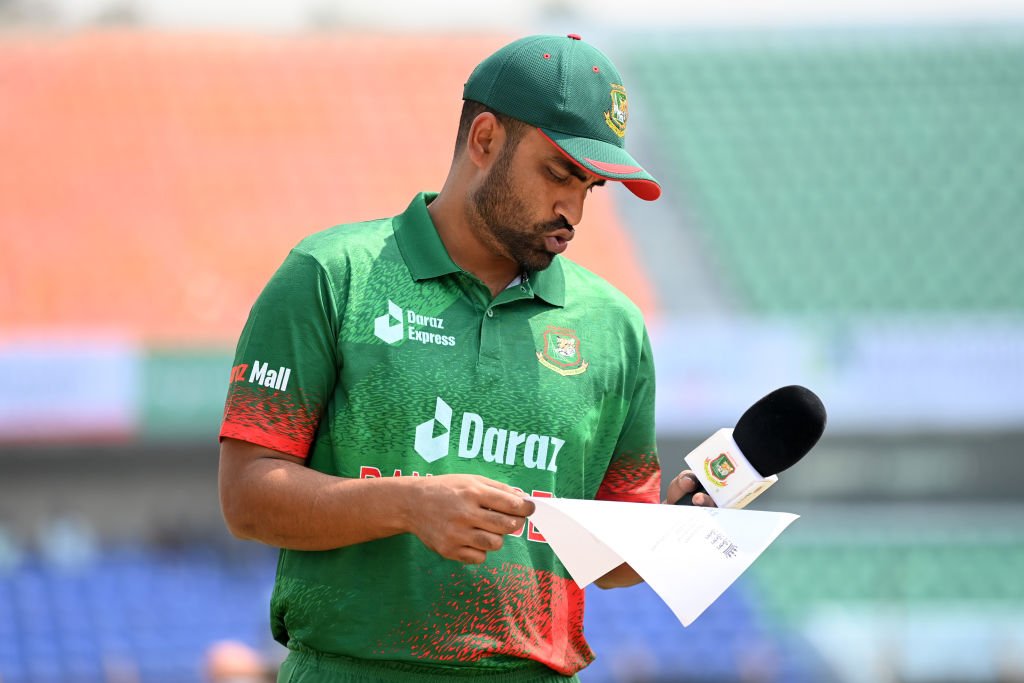
In a dramatic moment during the 2024 India vs Bangladesh Test series, Bangladesh’s veteran cricketer Tamim Iqbal voiced his concerns over the Decision Review System (DRS) tracking after a critical leg-before-wicket (LBW) decision went against his team. The decision in question came during Bangladesh’s innings when fast bowler Akash Deep delivered a ball to Tamim, which the on-field umpire deemed out. After reviewing the decision, the DRS tracking system showed that the ball would have hit the stumps, upholding the on-field umpire’s call, but Tamim was not convinced by the trajectory shown.
Tamim’s skepticism was clear when he remarked that the ball seemed to be “sliding down” the leg side, suggesting it wouldn’t have hit the stumps as projected by the DRS. The system, which is designed to eliminate human errors in umpiring decisions, has faced criticism in the past for its accuracy, particularly concerning ball tracking and impact. In this instance, Tamim’s argument revolved around how the ball’s movement deviated from what he expected based on its initial trajectory.
The match, held at a pivotal point in the series, already carried significant weight. Bangladesh was in a delicate position as their top order struggled to withstand the Indian bowling attack. Players like Najmul Hossain Shanto and Mominul Haque had shown resilience, but losing Tamim to a controversial decision dealt a blow to Bangladesh’s chances.
This wasn’t the first time Tamim or other international cricketers have questioned the DRS system. It’s a topic that sparks debate in the cricketing world, especially in high-pressure matches where every wicket matters. Tamim’s comments were reminiscent of similar incidents in the past, where players have openly doubted the ball-tracking technology. The DRS system is not foolproof, and while it aims to increase fairness in the game, moments like these highlight its imperfections.
As the match continued, Bangladesh found themselves under pressure, trying to recover from key dismissals. Tamim’s dismissal added to the frustration, especially considering his role as a senior player. His experience in guiding the younger players is critical, and an unfortunate LBW call compounded the team’s struggles.
This particular Test match was marred by other weather-related interruptions, with rain halting play on multiple occasions. Both teams struggled to find rhythm due to frequent delays, and the wet, overcast conditions heavily influenced the course of the game. India’s bowling, especially from Akash Deep and Ravichandran Ashwin, put Bangladesh on the back foot from the outset, and the pitch offered plenty of assistance to the fast bowlers. Akash Deep, in particular, stood out with his pace and accuracy, consistently troubling the Bangladeshi batsmen with deliveries that nipped back into the left-handers, one of which led to Tamim’s contentious dismissal.
After the day’s play, several cricketing experts weighed in on the incident. While some sympathized with Tamim, pointing out the possibility of technological limitations, others defended the system, emphasizing its overall success rate in improving decision-making accuracy. The debate over DRS accuracy is not new, and it is expected to resurface as more such incidents occur in high-stakes games.
As Bangladesh continues its tour of India, moments like this could have a lasting impact on their morale. The team, known for its passionate fanbase and resilient cricket, will need to regroup quickly. For Tamim Iqbal, leading from the front means overcoming such setbacks and guiding his team through challenging conditions. Bangladesh still has a lot to prove in this series, and despite the controversy, they will be aiming to put this moment behind them and focus on the remainder of the match.
In the broader context of international cricket, discussions surrounding DRS are likely to persist. Players like Tamim Iqbal, who have been part of the system since its inception, bring valuable perspectives to the ongoing debate. While technology has undoubtedly enhanced the fairness of the game, incidents like these remind us that no system is flawless.

